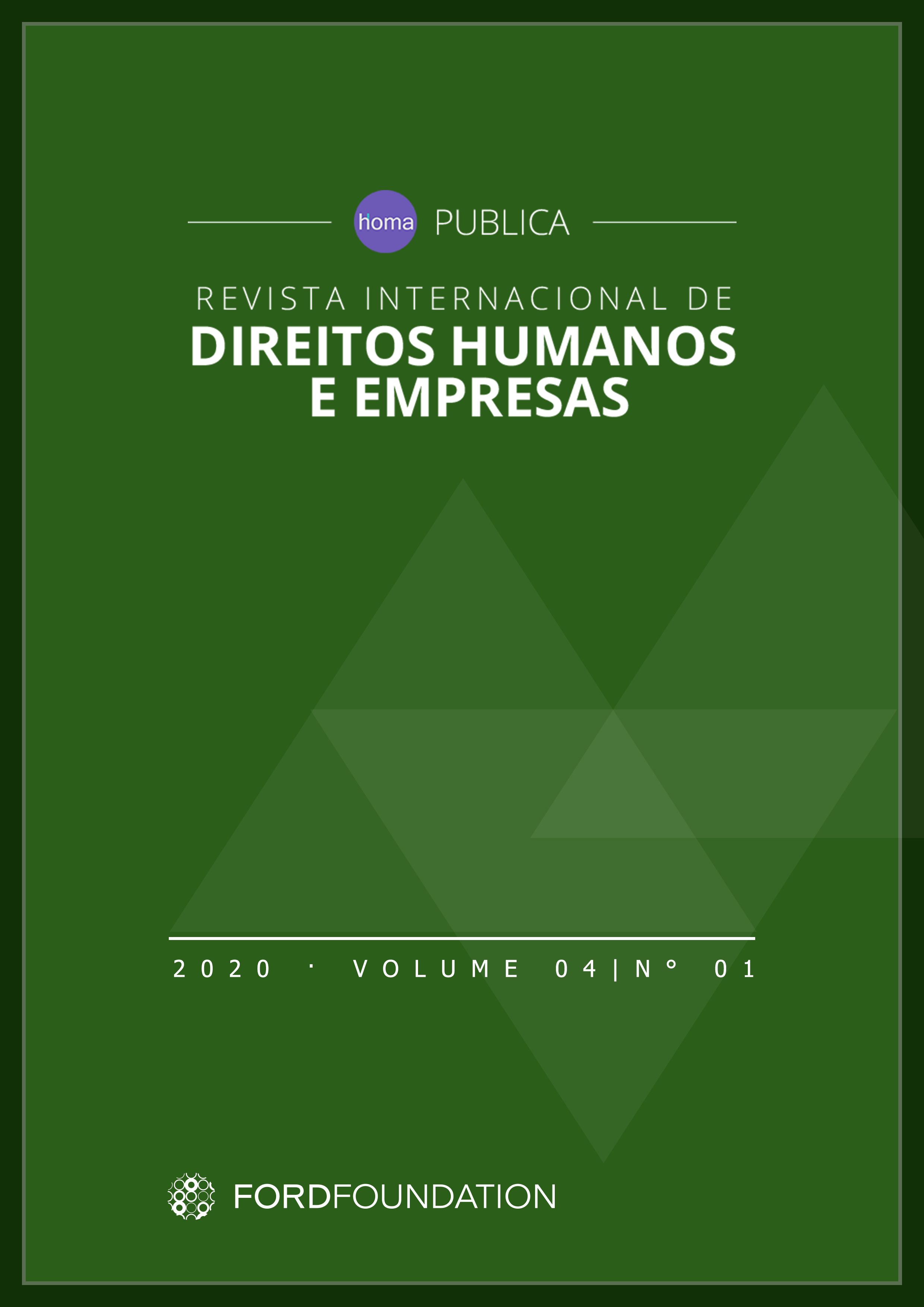Published 2020-05-08
Keywords
- Multinationais,
- Internal Perpections,
- Gender Equality,
- Banco do Brasil,
- Braskem
- Eletrobrás,
- Vale S.A. ...More
How to Cite
Abstract
The concept of gender equality has been interpreted in a myriad of ways by the different social actors and, for this reason, it continues to be one of the greatest challenges for the full realization of human rights. According to legal pluralism theory, in every society, two or more legal systems not belonging to a single ‘system’ coexist. It is, however, unknown to what extent non-state actors contribute to the ‘bending and breaking’ of rules in legal systems that are inherently pluralistic in the juristic sense. In order to solve this epistemological problem, a post-doctoral research entitled “The concepto of gender equality and multinational corporations” delved into the impacto f multinationals on the concepto of gender equality. The empirical study focused on four Brazilian multinationals, Banco do Brasil, Braskem, Eletrobrás and Vale S.A., during the period of three years, 2015, 2016 and 2017. The data gathering was divided into three parts: the analysis of key internal documents dealing with gender equality produced by the aforementional corporations; judicial decisions involved these corporations; and interviews with workers connected to the same corporations. This article only focuses on the results arising out of the interviews.
Downloads
References
AGAMBEN, Giorgio. Homo Sacer: Sovereign Power and Bare Life. Stanford: Stanford University Press, 1998.
BAKKER, Isabella. Introduction: Engendering Macro-economic Policy Reform in the Era of Global Restructuring and Adjustment. In: Bakker, I., ed., The Strategic Silence: Gender and Economic Policy: Gender and Economic Policy. London: Zed Books, 1994.
BRANCO, Manuel. Economia Política dos Direitos Humanos. Lisboa: Silabo, 2012.
COHEN, Elizabeth. Semi-Citizenship in Democratic Politics. Cambridge: Cambridge University Press, 2009.
CORNWALL, Andrea. Introductory overview - buzzwords and fuzzwords: deconstructing development discours. In: Cornwall, A. and D. Eade (eds.). Deconstructing Development Discourse: Buzzwords and Fuzzwords. Oxford: Practical Action Publising, 2010.
CUNHA, Teresa. Women InPower Women: Democracy, dignity and good living in non-capitalist experiences. Working Paper, ALICE - Strange Mirrors; Unsuspected Mirrors. Coimbra: CES, 2015.
CRENSHAW, Kimberlee. 1991. Mapping the Margins: Intersectionality, Identity Politics, and Violence against Women of Color. Stanford Law Review, 43 (6): 1241-1299,
DAHL, Tove. O Direito das Mulheres uma Introdução à Teoria do Direito Feminista. Lisboa: Fundação Calouste Gulbenkian, 1993.
DINIZ, Simone, D’OLIVEIRA, Ana Flavia and LANSKY, Sonia, 2012. Equity and Women’s Health Services for Contraception, Abortion and Childbirth in Brazil. Reproductive Health Matters, 20 (4), pp. 94-101.
ENGLE MERRY, Sally. 1988. Legal Pluralism. Law & Society Review, 22 (5), pp. 869-896.
ENGLE MERRY, Sally. 1992. Anthropology, Law, and Transnational Processes. Annual Review of Anthropology, 21 (October), pp. 357- 79.
FOUCAULT, Michel. The Subject and Power. In: Dreyfus, H. and Rabinow, P., eds., Michel Foucault: Beyond Structuralism and Hermeneutics. Chicago: The University of Chicago Press, 1982.
GIDEON, Jasmine. 2012. Engendering the Health Agenda? Reflections on the Chilean Case, 2000-2010. Social Politics: International Studies in Gender, State and Society, 19 (3), pp. 293-298.
GRAMSCI, Antonio. Cadernos do Cárcere. Rio de Janeiro: Civilização Brasileira, 2002.
GREADY, P. and ENSOR, J. Introduction. In: Gready, P. and Ensor, J., eds., Reinventing Development? Translating Rights-Based Approaches from Theory into Practice. London: Zed Books, 2005.
GUY, Donna. 1990. Public Health, Gender and Private Morality: Paid Labor and the Formation of the Body Politics in Buenos Aires. Gender and History, 2 (3), pp. 297-317.
HTUN, Martha. and POWER, Timothy. 2006. Gender, Parties and Support for Equal Rights in the Brazilian Congress. Latin American Politics and Society, 48 (4), pp 83-98.
MASSEY, Doreen. 2013. Vocabularies of the economy. In: Hall, S., Massey, D. and Rustin, M., eds., After neoliberalism? The Kilburn manifesto. Soudings: A Journal of Politics and Culture, 54 (July), pp. 9-22.
MOLYNEUX, Maxine. 2007. Change and Continuity in Social Protection in Latin America: Mothers at the Service of the State? Gender and Development Programme Paper, 1, Geneva: UNRISD.
PIERSON, Paul. 1993. When Effect Becomes Cause: Policy Feedback and Political Change. World Politics, 45 (4), pp. 595-628.
PIERSON, Paul. Politics in Time: history, institutions, and social analysis. Princeton: Princeton University Press, 2004.
PRÜGL, Elisabeth. 2017. Neoliberalism with a Feminist Face: Crafting a new Hegemony at the World Bank. Feminist Economics, 23 (1), pp. 30-53.
SANTOS, Boaventura. Sociología jurídica crítica. Para un nuevo sentido común del derecho. Bogotá: ILSA, 2009.
SANTOS, Boaventura. Se Deus Fosse Um Activista dos Direitos Humanos. Coimbra: Almedina, 2013.
TORNHILL, Sofie. 2016. “A bulletin board of dreams”: corporate empowerment promotion and feminist implications. International Feminist Journal of Politics, 18 (4), pp. 528-543.
UNITED NATIONS ECONOMIC AND SOCIAL COUNCIL. (2017). Progress towards the Sustainable Development Goals: Report of the Secretary-General, E/2017/66. New York: United Nations.
UNZUETA, Maria Angeles. Igualdade y “Discriminación Positiva’: Un Esbozo de Análisis Teórico-Conceptual. In: Lombardo, E. and Inda, A., eds., Género y derechos humanos. Zaragoza: Mira, 2002.

